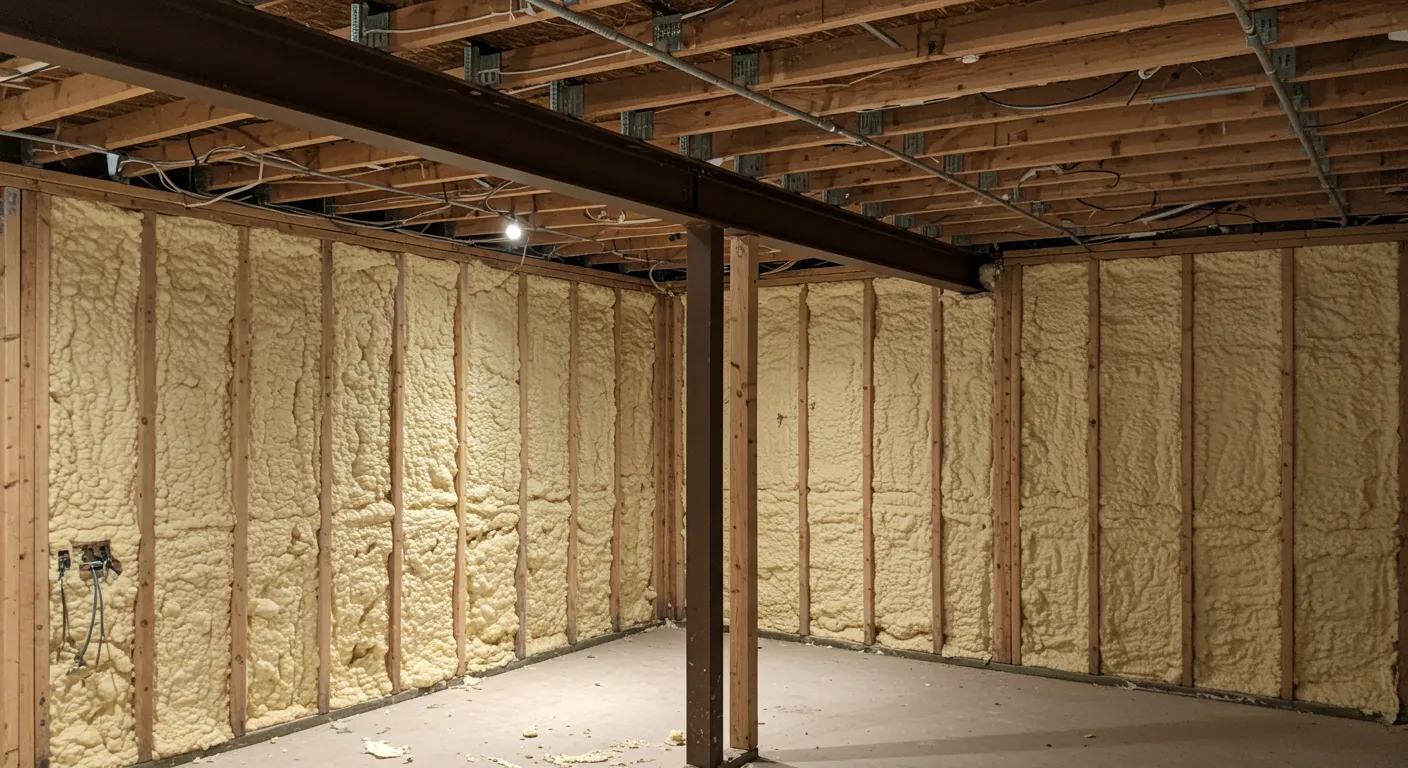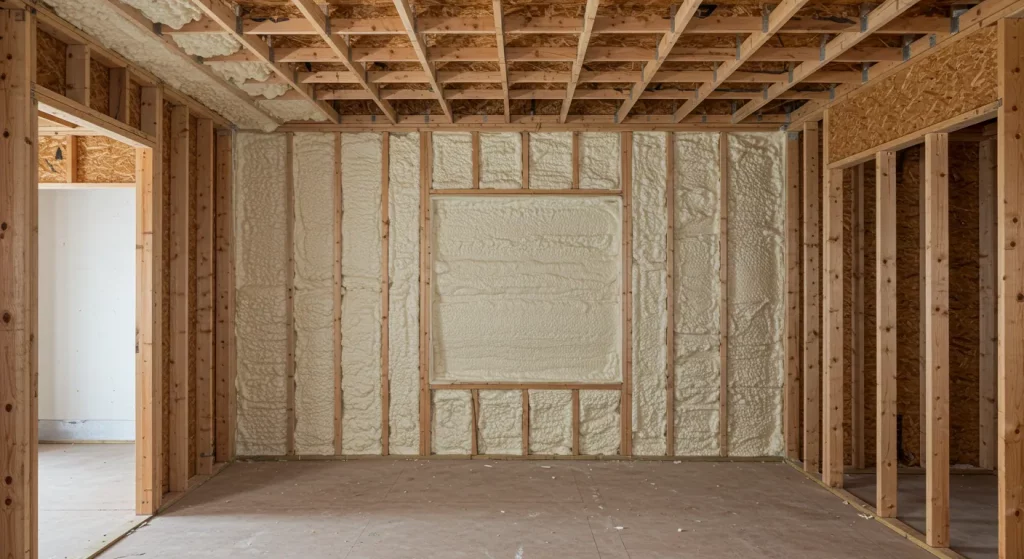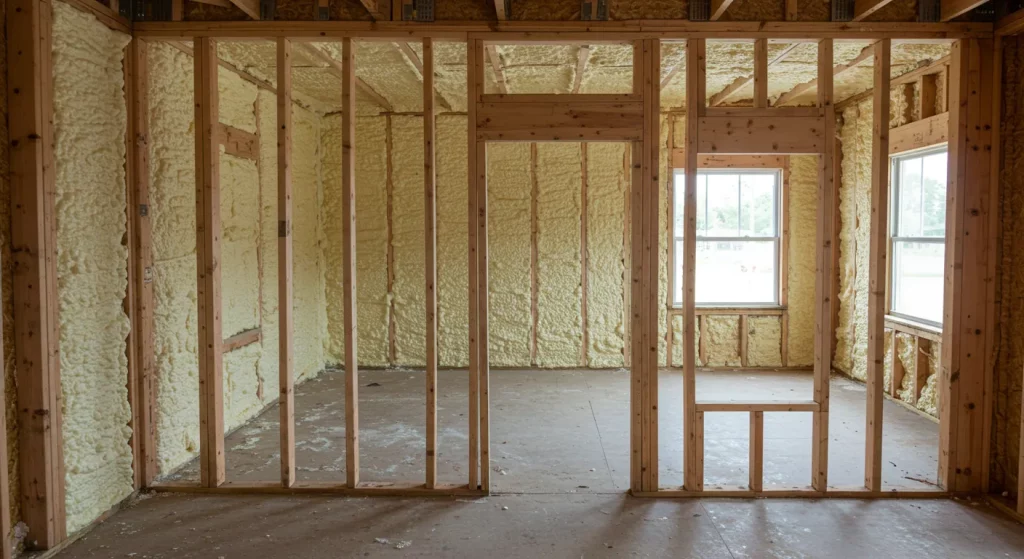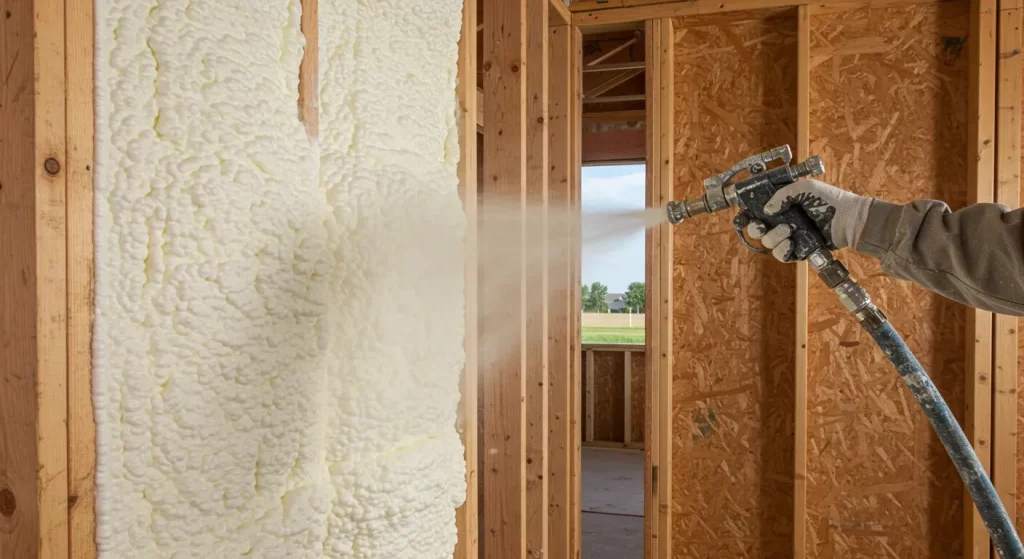Want a greener home and lower utility bills in Raleigh? Your basement may be the hidden source of energy loss and poor air quality — but the right insulation can change that.
At Raleigh Excel Spray Foam, we specialize in eco-friendly basement insulation that performs in North Carolina’s humid climate. This guide breaks down the top green insulation choices — and why closed-cell spray foam is the most reliable option for long-term energy savings and moisture protection.
Why Raleigh Basements Need Eco-Friendly Insulation
Basements are naturally prone to moisture, drafts, and heat loss. Poor insulation in this area can account for up to 30% of a home’s total energy loss, according to the U.S. Department of Energy. The right insulation strategy not only lowers your carbon footprint but also boosts indoor comfort and home value.
Compare the Best Green Basement Insulation Options
| Insulation Type | Eco Rating 🌿 | R-Value (per inch) | Moisture Resistance | Longevity | Best For |
| Closed-Cell Spray Foam | ✅✅✅ | R-6.5 to R-7 | Excellent | 30+ yrs | Full moisture + air seal |
| Cellulose (Recycled) | ✅✅✅ | R-3.2 to R-3.8 | Moderate | 20–30 yrs | Above-ground walls |
| Mineral Wool | ✅✅ | R-3.0 to R-4.0 | Good | 25+ yrs | Soundproofing, fire areas |
| Cotton (Denim) | ✅✅ | R-3.0 to R-3.7 | Poor | 20 yrs | Dry spaces only |
| Fiberglass (Low VOC) | ✅ | R-2.9 to R-3.8 | Poor | 10–15 yrs | Budget-friendly zones |
Why Spray Foam Is the Best Choice for Raleigh Basements
Seals Air and Moisture in One Step
Unlike batt or roll insulation, closed-cell foam expands to seal every crack preventing air leaks and moisture buildup that lead to mold or rot.
High R-Value in Minimal Space
Basements often have limited framing space. Spray foam’s high R-value means you can achieve code compliance without losing square footage.
Long-Term Energy Efficiency
It acts as both insulation and vapor barrier, delivering consistent performance for decades no settling, sagging, or replacement needed.
Bonus Tip: Ask your installer to use low-GWP spray foam products to reduce climate impact during installation.
Closed-Cell Spray Foam: Specs That Matter in NC Homes
| Specification | Value / Description |
| Typical R-Value | R-6.5 to R-7 per inch |
| Vapor Permeability | 0.8 perm at 1” (acts as vapor barrier) |
| Blowing Agent | Water-based or low-GWP alternatives |
| Material Density | ~2.0 lbs/ft³ |
| Flame Spread Index | Meets ASTM E84 Class 1 |
Before You Insulate: 3 Must-Do Steps in Raleigh
Before jumping into installation, consider these:
1. Ventilation Check
Ensure proper basement ventilation. Although spray foam helps seal air leaks, mechanical ventilation may be needed for fresh airflow.
2. Moisture Evaluation
Check for groundwater leaks, efflorescence, or dampness. Seal foundation cracks before insulating.
3. Available Rebates
Many utility providers and state programs offer rebates or tax incentives for eco-friendly insulation. In North Carolina, Duke Energy and local municipalities often provide seasonal offers.
Bonus Tip: Combine insulation upgrades with energy audits to unlock deeper rebates.
Top Spray Foam Questions Raleigh Homeowners Ask
- Is spray foam safe for indoor air quality?
Yes modern low-VOC and GREENGUARD-certified foams minimize chemical off-gassing. - Can I insulate an already finished basement?
Absolutely retrofit foam injection can be used behind drywall, though costs are higher than during new construction. - What about resale value?
Energy-efficient basements are increasingly attractive to buyers, especially when paired with green certifications.
Things to Know Before Choosing Eco-Friendly Basement Insulation
- Basement Use: Finished living space vs. storage changes insulation needs.
- Wall Type: Masonry vs. wood frame affects material compatibility.
- Humidity Levels: High moisture zones demand materials that resist mold growth.
- Budget vs. ROI: Closed-cell foam has a higher upfront cost but delivers long-term savings.
- Building Code Compliance: Check local R-value requirements and fire rating standards.
Ready to Achieve Sustainable Comfort?
If you’re looking for energy savings, moisture protection, and a greener home, spray foam insulation is the smart choice especially in the basement, where performance matters most.
Apply these insights now: Schedule your free insulation consultation with Raleigh Excel Spray Foam Insulation and take the first step toward sustainable comfort.
(919) 301-9435
[email protected]
Your Insulation Questions Answered by Raleigh Excel Spray Foam Insulation
Is spray foam really eco-friendly if it’s a synthetic material?
Yes its long-term performance reduces energy use drastically, and many new formulations use eco-friendly blowing agents.
Can I combine spray foam with other insulation types?
Definitely. Hybrid systems (e.g., spray foam + mineral wool) can balance budget, performance, and environmental goals.
How long does it take to install basement insulation?
Most projects take 1–2 days, depending on basement size and prep work needed.
Will spray foam help with soundproofing too?
Yes while closed-cell foam is denser, open-cell foam offers even better sound absorption. We’ll help you choose based on your goals.
Is it better to insulate interior or exterior basement walls?
Interior insulation is more common and cost-effective for existing homes, especially in climates like Raleigh’s.







